| Listing 1 - 10 of 59 | << page >> |
Sort by
|
Book
ISBN: 9782213633473 2213633479 Year: 2007 Publisher: Paris : Fayard,
Abstract | Keywords | Export | Availability | Bookmark
 Loading...
Loading...Choose an application
- Reference Manager
- EndNote
- RefWorks (Direct export to RefWorks)
Germany --- Politics and government --- Germany - Politics and government - 1918-1933 --- Allemagne --- 1918-1933 (République de Weimar)
Book
ISBN: 0333274660 Year: 1993 Publisher: Houndmills ; London The MacMillan Press
Abstract | Keywords | Export | Availability | Bookmark
 Loading...
Loading...Choose an application
- Reference Manager
- EndNote
- RefWorks (Direct export to RefWorks)
Germany --- Politics and government --- 1918-1933 --- National socialism --- Germany - Politics and government - 1918-1933.
Multi
ISSN: 05684323 ISBN: 9783525370636 3525370636 Volume: 99 Publisher: Göttingen.
Abstract | Keywords | Export | Availability | Bookmark
 Loading...
Loading...Choose an application
- Reference Manager
- EndNote
- RefWorks (Direct export to RefWorks)
Hans Delbrück (1848–1929), a public conservative intellectual, lived during the time of the Weimar Republic. He published a lot of articles for several newspapers and was involved in the following three major political debates: Firstly he made as a 'Vernunftrepublikaner' several proposals to bring the new republic to a success, even though he was still convinced of the Prussian-German monarchy. Secondly he researched the war guilt question, harshly criticized the assumption that Germany was the only guilty state and pleaded for a fair-minded approach to reach a reconciliation with all European nations. Thirdly Delbrück rejected as a protagonist the stab-in-the-back legend and proved as a leading military (civil) historian that Germany suffered a military defeat different to the general claim. In contrast to the radical proposals from the political left and right, Delbrück started with these alternative explanations a fruitful debate to strengthen the young German republic
Germany --- Politics and government --- Germany. --- Germany - Politics and government - 1918-1933
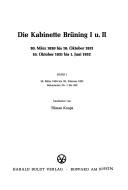
ISBN: 3764617500 9783764617509 Year: 1980
Abstract | Keywords | Export | Availability | Bookmark
 Loading...
Loading...Choose an application
- Reference Manager
- EndNote
- RefWorks (Direct export to RefWorks)
Germany --- Politics and government --- History --- Sources --- Germany - Politics and government - 1918-1933 --- Germany - History - 1933-1945 - Sources
Book
ISSN: 21054584 24946001 ISBN: 9782735124084 2735124088 Year: 2018 Publisher: Paris : Maison des sciences de l'homme,
Abstract | Keywords | Export | Availability | Bookmark
 Loading...
Loading...Choose an application
- Reference Manager
- EndNote
- RefWorks (Direct export to RefWorks)
La 4ème de couv. indique : "En novembre 1918, l'Allemagne impériale devint une république démocratique, la première république de son histoire. Son avènement fut chaotique car indissociable de la défaite allemande sur le champ de bataille et de la révolution qui suivit. Fruits de recherches les plus récentes, les études réunies dans le présent ouvrage réévaluent des aspects essentiels et moins connus de cette transition politique : la parlementarisation progressive du régime depuis 1917 et les débats de fond, menés par les juristes et les politiciens, sur la nature du meilleur régime possible ; la question de la violence politique qui grève les débuts de la république : les expérimentations politiques à l'issue dramatique, comme les républiques des conseils de Bavière ; les mutations sociales, incarnées entre autres par le développement du mouvement féministe. Ces études prêtent une attention particulière au regard que portent sur les événements intellectuels comme Ernst Troeltsch ou Max Weber. Derrière le difficile passage à la république se pose en effet une question essentielle - qui se posera à nouveau de manière impérieuse au début des années 1930 : le régime démocratique est-il vraiment armé pour résoudre les crises sociales et économiques ? On constatera que cette interrogation ne concernait alors pas seulement l'Allemagne, mais l'Europe entière."
Politik. --- Geschichte 1917-1923. --- Allemagne --- Deutschland. --- Politique et gouvernement --- Germany --- Politics and government --- Germany - Politics and government - 1918-1933
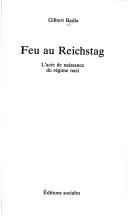
ISBN: 2209055199 9782209055197 Year: 1983 Publisher: Paris Editions sociales
Abstract | Keywords | Export | Availability | Bookmark
 Loading...
Loading...Choose an application
- Reference Manager
- EndNote
- RefWorks (Direct export to RefWorks)
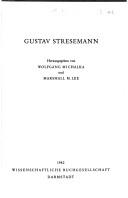
ISBN: 3534077350 9783534077359 Year: 1982 Volume: 539 Publisher: Darmstadt Wissenschaftliche Buchgesellschaft
Abstract | Keywords | Export | Availability | Bookmark
 Loading...
Loading...Choose an application
- Reference Manager
- EndNote
- RefWorks (Direct export to RefWorks)
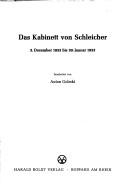
ISBN: 3764618582 9783764618582 Year: 1986 Volume: vol *10
Abstract | Keywords | Export | Availability | Bookmark
 Loading...
Loading...Choose an application
- Reference Manager
- EndNote
- RefWorks (Direct export to RefWorks)
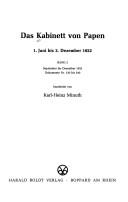
ISBN: 3764618752 9783764618759 Year: 1989 Volume: vol *16 Band 1 Publisher: Boppard am Rhein Boldt
Abstract | Keywords | Export | Availability | Bookmark
 Loading...
Loading...Choose an application
- Reference Manager
- EndNote
- RefWorks (Direct export to RefWorks)
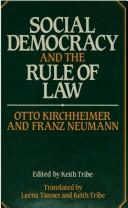
ISBN: 0043013007 9780043013007 Year: 1987 Publisher: London : Allen & Unwin,
Abstract | Keywords | Export | Availability | Bookmark
 Loading...
Loading...Choose an application
- Reference Manager
- EndNote
- RefWorks (Direct export to RefWorks)
Socialism --- Socialisme --- History --- Histoire --- Germany --- Allemagne --- Constitutional history --- Politics and government --- Histoire constitutionnelle --- Politique et gouvernement --- Socialism - Germany - History --- Constitutional history - Germany --- Germany - Politics and government - 1918-1933
| Listing 1 - 10 of 59 | << page >> |
Sort by
|

 Search
Search Feedback
Feedback About UniCat
About UniCat  Help
Help News
News